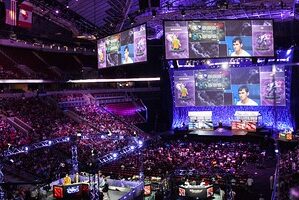All week, I’ve been looking at the realities of esports, from team, player, and investor perspectives. In many examples, I have focused on League of Legends teams, but the LCS isn’t the only esports league that has encountered deep water. In 2017, Activision Blizzard introduced the Overwatch League (OWL) with the stated intent of replacing the National Football League. OWL team owners plunked down $20M for the right to operate an OWL franchise. By 2018, Activision was the largest electronic game company in North America and Europe.
In 2019, the Overwatch League announced a format change that included “home cities” for its teams. OWL teams would travel more than 52,000 miles over the 19 weeks of the 2020 season to stadiums around the globe. To accommodate this, teams invested heavily in large tournament facilities that held thousands of spectators.
The 2020 season started as planned, but the pandemic quickly made hash of it. Following several weeks of postponements, OWL conducted the remainder of the season online. This model would continue until the Grand Finals of 2022, which was the first in-person OWL season finale until 2023.
After a series of public missteps including patent infringement lawsuits, defaults on royalty payments, suits by the State of California over sexual harassment and discrimination, a Securities Exchange Commission investigation, very public employee walkouts, subsequent sponsorship withdrawals, and torturous simultaneous Federal Trade Commission and European Union monopoly investigations, and being banned in China, the ignominious Activision Blizzard finally completed the sale of itself to Microsoft in October.
A mere six years after Activision Blizzard’s bold OWL proclamation, the National Football League will rake in more than $20B, and the Overwatch League is defunct. Call of Duty, another popular Activision Blizzard title with its similarly organized esports league faces the same agonizing demise.
Bad actors abound in esports
Under the name The Wolfpack, Denial Esports operated multiple esports teams, including Call of Duty, CS:GO, Halo, Heroes of the Storm, League of Legends, Overwatch, Paladins, and Smite in the US, UK and South America. In 2017, just four years after entering the scene, Denial Esports wavered amid reports of not paying their employees. In 2019, the team permanently ceased operations after it failed to pay its player salaries.
Earlier this year, Galaxy Racer hosted an all-women’s Apex Legends HER Galaxy tournament with a $100,000 purse. Galaxy Racer promoted the event to showcase female talent in esports. Six months later, the winning teams still have not been paid.
Gamers First (G1) bought the Women’s Car Ball (an all-women’s Rocket League circuit) in February 2023 and promptly stopped paying its players. Ironically (or maybe not) the reason that former owner KC Pioneers sold the league was its inability to pay its players’ salaries and the prize money the teams won during tournament play.
In 2019, Valve Software, the Washington-based game developer, sued esports tournament organizer Global Electronic Sports Championship (GESC) for failing to pay the winners of multiple Dota 2 tournaments in Indonesia and Thailand, as well as the events’ broadcast staff. In total, Valve alleged that GESC skipped out on more than $750,000 in prize money and broadcast staff payments. Dota 2 is a Valve Software title.
Andy “Reginald” Dinh is a former LoL player, founder, owner, and CEO of TSM. In 2022, Riot Games investigated Dinh after fielding credible allegations of abuse of TSM players. Employees, both current and former, including players, revealed instances of verbal abuse, harassment, hate speech, and profanity directed toward them by Dinh. Riot fined the team $75,000, directed Dinh to attend sensitivity training, and placed him on probation for two years.
Making dangerous comparisons to professional sports
It is very clear that the perilous landscape of esports has something unpleasant for everyone – teams, players, sponsors, leagues, governing bodies and fans. The financial pressure to make the model work is enormous. Comparisons to top-tier traditional professional sports are unfair, but that doesn’t stop people from making them. It also doesn’t stop investors, team owners, and even fans from expecting leagues and teams to produce both a polished, sustainable product and immediate financial returns.
Traditional sports rely on the physical attributes of the players, so it is easy to see why teams and leagues segregate by gender. Esports should be able to transcend this limitation, but the sheer toxicity of the playing environment makes that unlikely. Under these circumstances, it is hard to see how initiatives like Game Changers – which showcases the talents of marginalized players (like women and non-binary individuals) – will make a lasting impact on the game.
Esports are decidedly male-dominated, even though technically, the tournaments, teams, and leagues are open to both male and female players. The lack of diversity is not limited to the players. Coaches, management, and ownership roles are likewise male-dominated. This makes it very difficult for diverse individuals in any role to break into the professional esports environment.
Up to this point, I have been looking at issues facing players, teams, leagues, and investors. Tomorrow, I will look at the game developers who produce the software that esports players depend on.
Photo Credit: Prachatai, via Flickr












